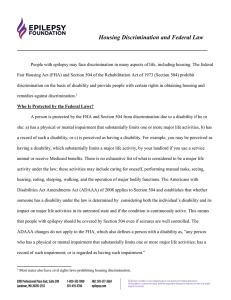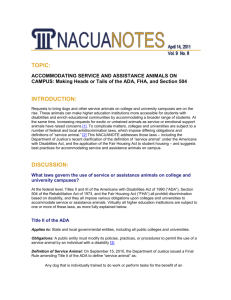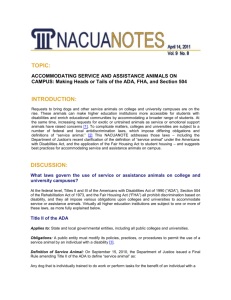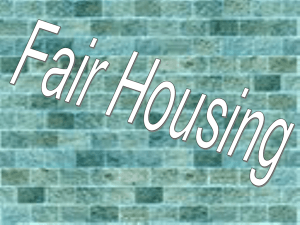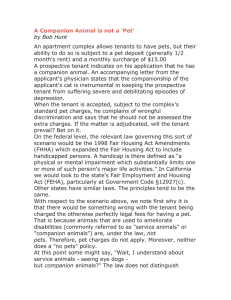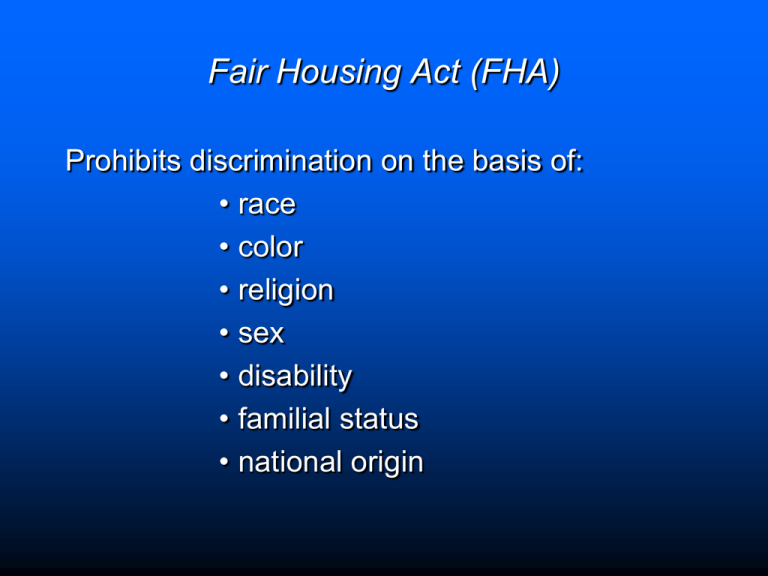
Fair Housing Act (FHA)
Prohibits discrimination on the basis of:
• race
• color
• religion
• sex
• disability
• familial status
• national origin
Who is NOT protected?
Age
Marital Status
Sexual Orientation
Source of Income
State or local law may prevent
discrimination on these grounds
FHA Covers “Dwellings”
•
•
•
•
•
houses and townhouses
apartments and condominiums
student housing
homeless shelters (even if stays are short-term)
vacation time shares (even if stays are part-time)
Not covered by FHA:
• hotels and other places of “temporary sojourn”
FHA Prohibits
•
Refusing to sell or rent after making bona fide offer
•
Refusing to negotiate for sale or rental of dwelling
•
Making unavailable or denying a dwelling
•
Discriminating in “terms, conditions, or privileges” of
sale or rental, or “in the provision of services or
facilities”
•
Making, printing, or publishing a statement or
advertisement indicating a preference or limitation
FHA Prohibits (cont’d.)
•
Representing that a dwelling is not available
when in fact it is
•
Discriminating in residential real estate-related
transactions or in the terms or conditions of such
transactions
•
Intimidating, threatening, or interfering with any
person for exercising her/his housing rights
•
Criminal threats, use of force, intimidation or
interference
Retaliation
The FHA also prevents retaliation for
exercising FHA rights.
Example: retaliation for advising someone
how to file a Fair Housing Claim
“Making Unavailable or Denying”
Homeowner refuses to rent or sell to an African-American
Landlord establishes a “no kids” policy at an apartment
complex not specifically designed for older persons
Town enacts or enforces zoning code to prevent group
home for persons in recovery from alcohol or illegal
drugs because of the residents’ disability
Architect and developer design and construct multi-family
housing without certain accessible features
Landlord demands sexual favors before agreeing to rent
apartment
Sex Discrimination includes
Sexual Harassment
“Quid Pro Quo”
– Special this month – 50% off the rent for sex
with the landlord
“Hostile Environment” – persistent physical
and/or verbal unwelcome sexual advances
– Would a reasonable person be offended?
“Terms, Conditions, or Privileges”
Landlord forces Hispanic renters to transfer to less desirable
apartments or buildings to make room for non-Hispanic
renters
Landlord charges families with children higher rent
Homeowners association allows ornaments on doors for
some religions but not others
Rental agent offers to waive security deposit for white “tester”
but not for black “tester”
Landlord refuses to designate a parking spot for a resident
who requests a “reasonable accommodation” because of
a disability
Special Disability Provisions
Landlords/Condo Associations must permit
an individual with a disability, at his or her
own expense, to make physical
modifications to the premises.
Must make reasonable accommodations in
rules, policies, practices or services to
afford a person with a disability equal
opportunity to use and enjoy a dwelling.
Examples
Refusal to rent to someone with a service
animal due to a no pet policy
Refusal to designate a suitable parking
space for a resident with a disability
Dwellings built after 1991 with four or
more units must have elevators or
accessible ground floor units.
What to do if you believe you or someone
you know is a victim of discrimination
File a lawsuit within 2 years after the occurrence or
termination of the alleged discriminatory act
File a complaint within 1 year with HUD or equivalent
state agency
If possible criminal conduct, call local law enforcement
immediately
If you’re not sure whether there is a violation, call HUD
HUD’s Role
Receives individual complaints of housing discrimination
Investigates and attempts to conciliate complaints
Refers pattern or practice cases and land use or zoning
cases to DOJ
May issue a “charge” of discrimination if “reasonable cause”
to believe discrimination occurred
Hearing before administrative law judge unless complainant
or respondent files notice of “election”
If no “election,” HUD represents complainant in
administrative proceedings
HOW DOJ Gets Involved in Enforcing Fair
Housing Act
Files “election” cases from HUD; acts on behalf
of complainant (who may intervene in suit)
Investigates other HUD referrals for possible
enforcement action
Independent authority to initiate lawsuits
alleging
• “pattern or practice” of discrimination
• denial of rights to group of persons
that raises issue of “general public
importance”
DOJ Enforcement Activities: Remedies
Injunctive relief (prevention and correction)
Monetary damages for aggrieved persons
includes emotional distress
Civil penalties (55K for the first violation)
Additional Sources of Information
Department of Justice, Civil Rights Division
www.usdoj.gov/fairhousing
www.usdoj.gov/crt
Housing Discrimination Tip Line
800-896-7743
fairhousing@usdoj.gov
RESOURCES
www.usdoj.gov/fairhousing
fairhousing@usdoj.gov
202- 514-4713 or 800-896-7743



